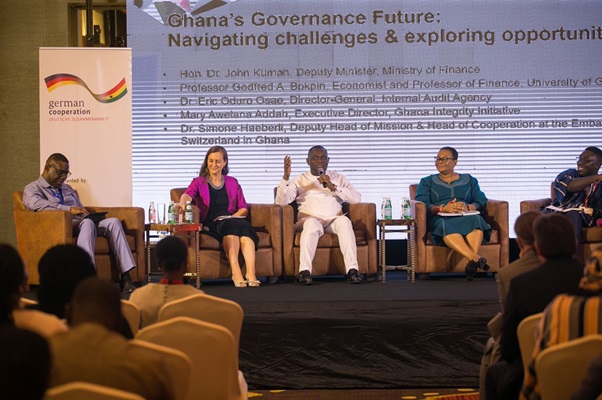Participants during the panel discussion
Various national and sub-national institutions in the country have been strengthened to finance inclusive development under the Governance for Inclusive Development programme (GovID).
The four-year GovID programme, implemented by the Deutsche Gesellschaft für Internationale Zusammenarbeit (GIZ) GmbH, worked in close partnership with the Ministry of Finance and the Ministry of Local Government and Rural Development towards ensuring that institutions do not only generate more revenue, but also use it in line with the development priorities and the needs of the citizens and the private sector.
Speaking at the national close-out event in Accra, GovID Programme Manager, Raphael Frerking, said the programme worked on the effectiveness and efficiency of public financial management and planning.
“We supported and built up accountability structures; and we initiated agricultural business dialogues,” he said.
He shared some notable results of the programme including the strong collaboration with the Ministry of Finance and the Ghana Revenue Authority which resulted in the development of the New Transfer Pricing Regulation and Excise Tax Stamp Policy which prevents tax evasion by the private sector.
“GovID supported the drafting of the Environmental Fiscal Reform Policy, the updated Double Taxation Agreement Policy and the policy for the taxation of High Net Worth Individuals,” he added.
Mr. Frerking also noted that accountability mechanisms were strengthened explaining that in 2018, only 58 % of the audit recommendations were implemented in the partner MMDAs, however, in 2022, the number stands at 85 % – which represents a significant increase.
He also said that the programme collaborated with the National Development Planning Commission (NDPC) to make the Medium-Term Development Plans more inclusive through trainings on Vulnerability Profiling and the development of a gender toolkit.
“Through the introduction of the district level revenue application (dLRev), the internally generated funds for all 100 partner MMDAs were in 2022 on average 25% higher than in 2018.
The programme facilitated 21 dialogue sessions between agribusinesses and selected partner districts which resulted in the development of 26 initiatives to improve the local competitiveness agribusinesses,” he added.
He thanked all stakeholders for their hard work, their vision, for the continued partnership and collaboration.
“I think we can say with confidence, that the programme has made great progress in achieving its objective of financing inclusive development in Ghana,” he said.
Deputy Minister Of Finance John Kumah expressed delight at the positive impact the programme has had on national and sub-national institutions.
“I would like to reiterate the fact that the GovID Programme will be ending on a higher note, by leaving with us an array of benefits and phenomenal success stories of good financial governance,” he said.
Mr. Kumah further assured that the government would work assiduously to sustain the great legacies, the lessons and good practices carved by the GovID Programme.
“We are also available for productive cooperation for the implementation of future programmes in governance and other development dimensions.
The partners who have demonstrated unwavering commitment to the successful implementation of the programme were recognised at an awards ceremony.
They include the Internal Audit Agency, CDD-Ghana, and National Devlopment Planning Commission (NDPC).
Some individuals who were honoured included Omar Seidu Director, Social and Demographic Statistics Directorate/SDGs Coordinator, Ghana Statistical Service, (GSS) Lawrence Ayagiba, Deputy Auditor General, Ghana Audit Service, Kwesi Ackaah, Head Property and Rent Tax Unit Ghana Revenue Authority, COP Maame Yaa Tiwaa Addo-Danquah, Executive Director, Economic and Organised Crime Office (EOCO), Alhaji Seidu Iddrisu Iddisah, Commissioner Customs Division, Ghana Revenue Authority, Akua Aniniwa Owusu-Asamoah, Ag. Head of Fiscal Decentralization Unit at MoF and chairperson of the IGFF committee and Fred Nyame and Moses Nyame Regional Mobile Team.
The programme was commissioned by the German Federal Ministry for Economic Cooperation and Development (BMZ) and supported with additional funding from the Swiss State Secretariat for Economic Affairs and the UK Foreign, Commonwealth and Development Office.
By Jamila Akweley Okertchiri


